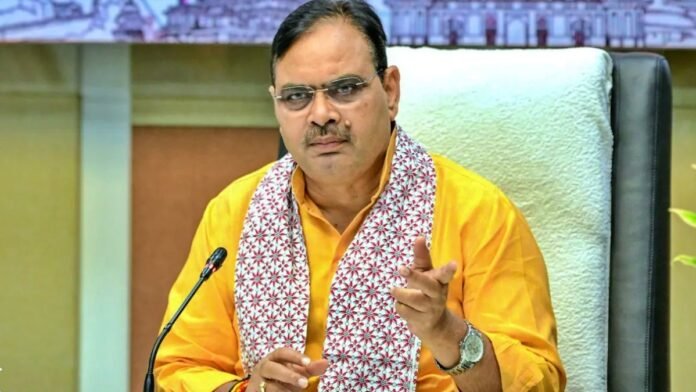
Key Points
- Governor Haribhau Bagde approves Prohibition of Unlawful Religious Conversion Bill, 2025 in October 2025
- Rajasthan Assembly passed the bill on September 9, 2025 amid strong opposition protests
- Law Department issues official notification enacting the legislation across Rajasthan
- General illegal conversions punishable with 7-14 years imprisonment and ₹5 lakh fine
- Mass conversions attract 20 years to life imprisonment with ₹25 lakh fine; institutional buildings face demolition
- Foreign funding for conversions: 10-20 years imprisonment and ₹2 million fine
- Marriages for conversion purposes declared invalid; compensation up to ₹5 lakh for victims
- 90-day prior declaration to Collector/ADM mandatory for voluntary conversions
- “Ghar Wapsi” (reconversion to original faith) specifically excluded from criminal provisions
- Similar laws already operational in Jharkhand, Karnataka, Gujarat, and Uttar Pradesh
Jaipur: In a significant development for Rajasthan’s governance and religious policy landscape, Governor Haribhau Bagde granted his assent to the Prohibition of Unlawful Religious Conversion Bill, 2025 in October 2025, transforming the controversial legislation into enforceable law. The Rajasthan Law Department has issued the official notification, formally enacting the bill that aims to prevent forced, fraudulent, or allurement-based religious conversions across the state.
The legislation, initially introduced during the February 2025 budget session and passed by the Rajasthan Assembly on September 9, 2025, represents a flagship initiative of Chief Minister Bhajan Lal Sharma’s BJP government. State authorities claim the law strengthens law and order while protecting religious freedom guaranteed under Article 25 of the Indian Constitution, which grants citizens the right to freely profess, practice, and propagate religion subject to public order, morality, and health.
Political Context and Opposition Response
The bill’s journey through the legislative process was marked by intense political confrontation. When introduced in February 2025’s budget session, the opposition particularly the Congress party staged vehement protests, creating significant disruption in the Assembly proceedings. Despite the uproar, the ruling BJP government pushed the legislation through without extensive debate, leveraging its numerical majority.
Minister of State for Home Affairs Jawahar Singh Bedham defended the legislation’s necessity, addressing opposition criticism directly. In his statement to media, Bedham specifically targeted the Leader of the Opposition, alleging that the opposition leader’s own district faces numerous religious conversion cases yet the leader opposes the law “at the behest of Delhi”—a reference suggesting Congress party’s central leadership influences Rajasthan’s opposition stance.
Bedham emphasized this is “not politics, but the state’s need,” framing the legislation as a practical response to ground realities rather than ideological positioning. He pointed to the law’s existence in multiple other states including Jharkhand, Karnataka, Gujarat, and Uttar Pradesh as precedent, suggesting Rajasthan is following an established pattern rather than pioneering controversial territory.
Historical Context of Anti-Conversion Efforts in Rajasthan
The current legislation represents a renewed attempt at anti-conversion legislation in Rajasthan, where previous efforts failed. Bedham referenced failed attempts during 2006-08 to implement similar laws in the state. That earlier period coincided with different political configurations, suggesting the current BJP government views its stronger mandate as enabling passage of legislation that previously proved politically unfeasible.
The minister specifically highlighted concerns about conversions in tribal areas driven by economic inducements. Rajasthan’s tribal populations, concentrated in southern districts like Udaipur, Dungarpur, and Banswara, have been focal points of conversion-related controversies for decades, with allegations from various quarters about missionary activity, economic incentives, and social pressure influencing religious choices.
Bedham noted that “dozens of cases, especially those related to marriage” have already been reported, suggesting the law responds to existing grievances and documented incidents rather than theoretical concerns.
Constitutional Framework and Justification
The legislation claims foundation in Article 25 of the Indian Constitution, which guarantees religious freedom while permitting state regulation. The article states: “Subject to public order, morality and health and to the other provisions of this Part, all persons are equally entitled to freedom of conscience and the right freely to profess, practise and propagate religion.”
Minister Bedham’s statement emphasized this constitutional balance: “The Constitution grants every citizen the right to practice their religion, but without harming others.” This framing positions the law as protecting religious freedom by preventing coercive conversions rather than restricting it a critical rhetorical strategy given constitutional protections for religious liberty.
The government argues that conversions achieved through “fraud, allurement, or coercion” violate the voluntary nature essential to genuine religious choice, justifying state intervention to preserve authentic religious freedom.
Comprehensive Legal Provisions
The Prohibition of Unlawful Religious Conversion Bill, 2025 contains extensive provisions establishing notification requirements, criminal penalties, and procedural mechanisms:
Mandatory Notification Requirements
The law establishes a strict prior notification system for all conversions:
Individual Conversions: Any person converting religion, or their legal guardian, must provide advance notice to local police or designated government authorities
Religious Leader Obligations: Religious leaders facilitating conversions must submit 2-month prior notice to authorities
Voluntary Conversion Procedure: Individuals seeking voluntary conversion must submit a 90-day advance declaration to the District Collector or Additional District Magistrate (ADM)
Public Declaration: Conversion intentions must be publicly declared, allowing objections to be filed
Objection Process: Authorities must hear and resolve objections within 2 months before conversion validity
This notification regime creates significant bureaucratic oversight over religious conversion, positioning the state as a gatekeeper for religious choice—a provision civil liberties advocates have criticized in similar laws elsewhere.
Criminal Penalties and Punishment Structure
The legislation establishes a graduated penalty system based on conversion circumstances and severity:
General Illegal Conversion: 7-14 years imprisonment plus ₹5 lakh fine; classified as non-bailable offense requiring trial in sessions court rather than lower courts
Mass Conversion: 20 years imprisonment extending to life imprisonment, plus ₹25 lakh fine; institutional buildings used for mass conversions subject to sealing or demolition following 72-hour notice (commonly termed “bulldozer action”)
Foreign or Illegal Funding: Conversions funded through foreign sources or illegal financial channels attract 10-20 years imprisonment plus ₹20 lakh fine
Repeat Offenses: Individuals convicted of conversion-related crimes face life imprisonment for subsequent violations
Facilitators and Intermediaries: Any person or entity assisting in illegal conversions faces prosecution with penalties comparable to primary offenders
The non-bailable nature of these offenses means accused persons cannot secure release as a matter of right, potentially resulting in extended pre-trial detention.
Marriage-Related Provisions
Recognizing concerns about “love jihad” alleged conspiracies to convert women through marriage—the law includes specific marriage-related provisions:
Marriage Invalidity: Marriages conducted with the primary purpose of religious conversion are legally invalid from inception
Family Court Jurisdiction: Family courts possess authority to annul marriages determined to be conversion-focused
Pre and Post-Marriage Conversions: Conversions occurring immediately before or after marriage are presumptively illegal
Victim Compensation: Individuals determined to be victims of marriage-based conversion schemes can receive compensation up to ₹5 lakh
These provisions significantly alter family law dynamics, potentially subjecting marital relationships to religious scrutiny and creating incentives for disgruntled family members to challenge interfaith marriages.
“Ghar Wapsi” Exemption
Notably, the legislation specifically excludes “Ghar Wapsi” from criminal provisions. This term, meaning “homecoming” in Hindi, refers to reconversion of individuals to their ancestral or previous religion typically involving conversion of Muslims and Christians to Hinduism.
This exemption has drawn criticism for creating perceived double standards, where conversions to certain religions face criminal penalties while conversions to others receive legal protection. Supporters argue it merely recognizes the difference between original conversion and return to ancestral faith.
Communal Harmony Objective
The bill’s preamble and provisions emphasize maintaining “peace and communal harmony in society during religious conversions.” This language frames the legislation as protecting social stability rather than regulating religious practice per se, though critics argue the effect remains state interference in religious choice regardless of stated objective.
Implementation Challenges and Concerns
The law’s implementation will face several practical and constitutional challenges:
Definitional Ambiguity: Terms like “allurement,” “inducement,” and “fraud” lack precise definition, potentially enabling arbitrary application based on subjective interpretation
Evidentiary Burdens: Proving religious conversion occurred through coercion or fraud rather than genuine conviction poses significant evidentiary challenges
Judicial Scrutiny: Similar laws in other states have faced constitutional challenges; Rajasthan’s version likely will encounter legal petitions questioning its validity
Administrative Capacity: Processing 90-day advance notifications, conducting inquiries, hearing objections, and determining conversion legitimacy requires substantial administrative infrastructure
Interfaith Marriage Impact: The marriage provisions may chill legitimate interfaith relationships, with couples fearing legal complications
Minority Community Concerns: Religious minorities express fears the law will be weaponized to harass legitimate religious practice and evangelism
Comparative Context: Anti-Conversion Laws Across India
Rajasthan joins multiple Indian states with anti-conversion legislation:
Uttar Pradesh: The Prohibition of Unlawful Conversion of Religion Ordinance, 2020 (later made permanent) includes similar provisions with stringent penalties
Madhya Pradesh: The Madhya Pradesh Freedom of Religion Act, 2021 contains comparable notification requirements and criminal provisions
Karnataka: The Karnataka Protection of Right to Freedom of Religion Act, 2022 faced significant controversy and legal challenges
Gujarat: One of the earliest adopters with the Gujarat Freedom of Religion Act, 2003
Himachal Pradesh: The Himachal Pradesh Freedom of Religion Act, 2019 follows similar patterns
Uttarakhand: The Uttarakhand Freedom of Religion Act, 2018 established the template followed by subsequent states
These laws share common features prior notification requirements, criminal penalties for “forcible” conversions, and heightened scrutiny of marriage-related conversions while varying in specific penalties and procedural details.
National Debate and Broader Implications
The proliferation of anti-conversion laws across BJP-governed states reflects broader debates about religious freedom, minority rights, and the appropriate scope of state regulation of religious practice in India’s constitutional framework.
Supporters argue: Such laws protect vulnerable populations (particularly tribal communities, Dalits, and women) from exploitation, prevent communal tensions arising from aggressive proselytization, and uphold genuine religious freedom by ensuring conversions are voluntary
Critics contend: The laws violate constitutional guarantees of religious freedom including the right to propagate religion, create chilling effects on legitimate religious practice and interfaith relationships, disproportionately target minority communities (particularly Christians and Muslims), and enable harassment through vague definitional standards
The Supreme Court of India has not definitively ruled on the constitutional validity of modern anti-conversion laws, though earlier judgments upheld state authority to regulate conversions in limited circumstances. Legal challenges to Rajasthan’s new law appear inevitable.
Impact on Rajasthan’s Social Fabric
Rajasthan’s religious demographics approximately 88% Hindu, 9% Muslim, 1.4% Sikh, and smaller Christian, Jain, and Buddhist populations mean the law’s impact will primarily affect minority communities engaged in religious outreach and interfaith marriages.
Tribal areas in southern Rajasthan, where Christian missionary activity has historical presence and where socioeconomic factors make populations potentially more responsive to conversion appeals, will likely see heightened enforcement focus.
The law’s passage and implementation may influence:
Interfaith Relations: Potential increase in communal suspicion and decreased interfaith dialogue
Marriage Patterns: Reduction in interfaith marriages or increase in couples relocating to states without such laws
Religious Institutions: Increased caution by churches, mosques, and other minority religious institutions in outreach activities
Civil Society: Polarization between supporters viewing the law as protective and opponents seeing it as discriminatory
The coming months will reveal how aggressively authorities enforce the legislation and whether courts intervene to modify or invalidate its provisions, shaping Rajasthan’s approach to religious pluralism and state-religion relations for years ahead.





















































